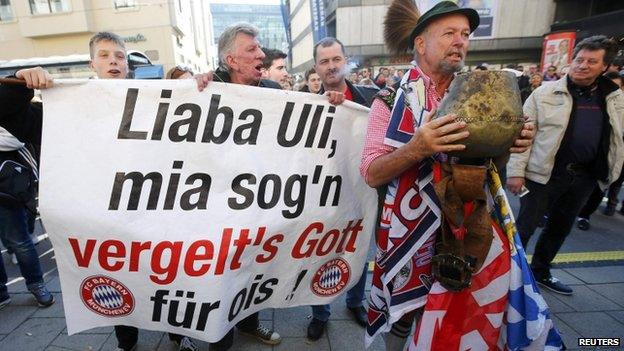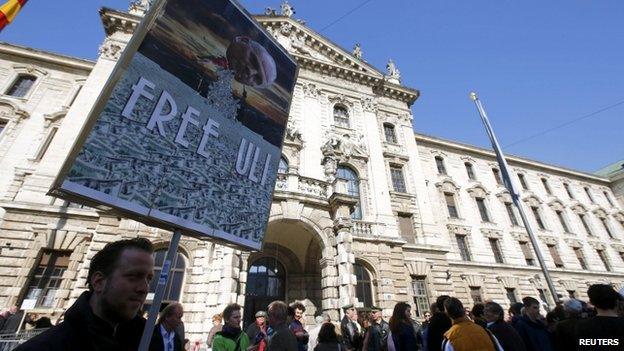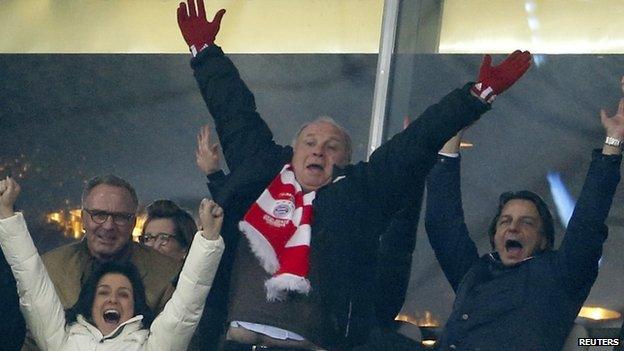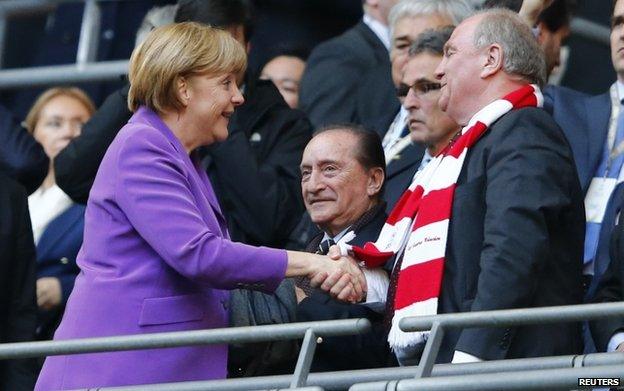Hoeness trial: Bayern Munich boss found guilty
- Published
The BBC's Steve Evans said Uli Hoeness will make an appeal
A German court has sentenced Uli Hoeness, president of European football champions Bayern Munich, to three years and six months in jail for tax evasion.
He admitted defrauding German tax authorities of millions of euros.
The former World Cup-winning Germany striker, 62, had kept the funds in a secret Swiss bank account.
His lawyer had argued he should escape punishment because he gave himself up. But judges ruled his confession fell short of full disclosure.
Hoeness was initially charged with evading 3.5m euros (£2.9m; $4.9m) in taxes but he then admitted to dodging another 15m euros.
It finally emerged in court that he owed a total of 27.2m euros.
'Not valid'
On Thursday the court in the southern city of Munich found Hoeness guilty of "seven serious counts of tax evasion".
"The voluntary disclosure is not valid with the documents that were presented alone," the judge said.
The defence said it would appeal against the sentence. Meanwhile Hoeness will remain free until a final verdict has been handed out.
Prosecutors had called for a term of five years and six months.
Bayern Munich fans were gathered outside the court building, holding up banners expressing support for the football boss.

Outside the court, Hoeness fans hold a banner reading: "Dear Uli, We say thank you for everything"

Despite the scandal, the football boss remains a popular figure at the club he helped build up
The BBC's Stephen Evans in Berlin says the sentence is significant because it indicates that attitudes towards tax evasion have changed in Germany since the financial crisis.
A string of famous people, perhaps not normally associated with cheating on tax, have recently been revealed to have had secret bank accounts, our correspondent reports.
But Hoeness could be the first to go to prison, he adds.
The football legend, who helped Germany win the 1972 European Championship and then the World Cup two years later, came clean about his secret bank account last year, filing an amended tax return in the hope of an amnesty in return for paying the tax he owed.
But prosecutors said he did so because investigators were already pursuing his case.

On Tuesday, Hoeness was celebrating his club's win against Arsenal in the Champions League

Chancellor Angel Merkel was on good terms with the ex-footballer before the scandal emerged
Earlier this week, he told the court he deeply regretted his "wrongdoing".
"I will do everything necessary to ensure that this depressing chapter for me is closed," he said.
The case has been described as one of the most spectacular of the year by the German newspaper Sueddeutsche Zeitung.
Despite the tax evasion scandal, Mr Hoeness remains a very popular figure at the club he helped build up.
He offered his resignation at last year's annual meeting but was backed by the supporters and the club's board.
- Published10 March 2014
- Published10 March 2014
- Published24 April 2013
- Published22 April 2013
- Published26 May 2013